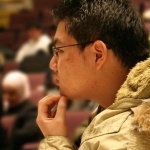July 7, 2010
Bigots ban Indian televangelist
It seems that whenever Muslims gather in large numbers, Canada's media hatemongers resort to rants full of played-out post-9/11 suspicion and xenophobia.
The latest target of this knee-jerk bigotry was the annual Journey of Faith Conference, held at the Metro Toronto Convention Centre July 2 to 4. It was the third consecutive year the centre has been the site for arguably North America’s largest Islamic gathering.
Speakers addressed topics like spiritual guidance to civic participation, but that didn’t stop the Calgary Herald from labeling the conference a “hatefest.”
This year, controversy was provided by top-billed Indian Muslim “televangelist” Zakir Naik.
A physician from Mumbai, he heads Peace TV, one of the world’s largest Islamic television channels.
Naik has spoken out against the Western media’s portrayal of Muslims, especially in the post-9/11 era. His fiery rhetoric about the plight of Muslims led the U.K. to deny him entry, claiming that his presence would “not be conducive to the public good.”
Canada followed in the U.K.’s footsteps to deny Naik a visa to speak at the conference.
Naik claims that his words have been taken out of context, and that the British government caved in to internal pressure from advocacy groups that wanted him banned. One piece of evidence that allegedly demonstrates Naik’s “hatred” is his statement that every Muslim should be a terrorist.
However, if one listened to the entire statement in context, what Naik said isn’t so scary:
“When a robber sees a policeman, he’s terrified. So, for a robber, a policeman is a terrorist. So, in this context, every Muslim should be a terrorist to the robber. I am aware that a terrorist is more commonly used for a person who terrorizes an innocent person. In this context, no person should even terrorize a single, innocent human being.”
This is hardly a statement calling for terrorism and the destruction of non-Muslims, but proving what Naik said or didn’t say isn’t really the issue.
A nation has the right to reject entry to persons or elements that it considers dangerous or a threat to its people.
Given the weak evidence produced by the U.K. and Canada, though, Zakir Naik does not qualify as dangerous. He has the right to come to express his opinions, regardless of who may or may not agree with him.
The overall attitude and perception of both the Canadian media and government toward the conference illustrates Canada’s inability to accept its Muslim population without xenophobia and suspicion.
Be it for political, cultural or religious reasons, Canada’s multicultural character cannot be correctly exemplified until, as a nation, it embraces the whole of its Muslim citizens.








